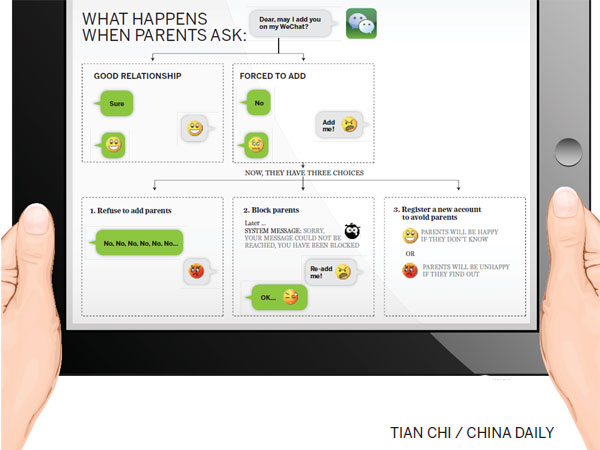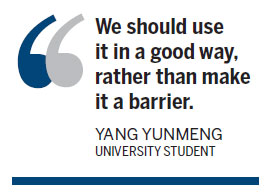Family networks
Updated: 2013-09-15 07:33
By Xu Lin (China Daily)
|
|||||||||||
Yuan, the 16-year-old, started his mothers' accounts, so he knows her passwords - and uses them without her knowledge.
"If she posts something embarrassing about me on her micro blog, I'll log on her account and delete it," he says.
Yuan says his classmate's mother followed her boy's micro blog. The boy believed it was a classmate who admired him, since the posts were encouraging.
When he discovered the truth, he changed his mother's password and told her hackers had hijacked the account.
|
|
Such bait-and-switch tactics are commonly used by the younger generation.
Shanxi province native Ning Cuiming secretly added her 17-year-old nephew's QQ and WeChat to see if he had a puppy love relationship that could affect his studies. Upon discovering this, the boy unfriended his 49-year-old aunt on WeChat gave his QQ account to Ning's daughter. Ning didn't know about the switch for some time, and her daughter didn't realize until later why the boy had given her his account.
Ning says: "I just noticed he blocked me on WeChat. I'm very angry because he must have an ulterior motive."
Her nephew Ning Shaogang tells China Daily he did it because he needs privacy. Understanding and trust are the bases of communication, he says.
Lu Dan'ni, a 32-year-old primary school teacher in Guangdong province's Shantou, says: "The older generation doesn't have an awareness of privacy. They even had to report their marriages and divorces to service organizations and companies in the old days. It's easy to understand their actions if you know about their backgrounds."
While there are many distinctively Chinese contours to familial SNS relationships, the existence of such relationships is an international phenomenon.
US website Onlineeducation.net's survey found 92 percent of American parents on Facebook are their children's friends on the site. Half the parents say they joined the site to keep tabs on their kids.
And one in three teens on Facebook feel embarrassed by comments left by their parents, the survey finds. Comparably, 30 percent say they would unfriend their parents if they could.
Also, globally speaking, monitoring their children isn't the only reason parents start SNS accounts. Many enjoy their own social media lives.
Lu, the teacher, helped her 60-year-old mother Xie Yanying open a WeChat account because her mom was curious about the new technology and knew relatives her age were using it. Xie says it's also a great way to get news.
And Xu, the editor, often uses her micro blog for work, to share experiences and views, and communicate with colleagues.
She has continued using her micro blog long after her son - her original reason for getting her accounts - blocked her.
The mother and her boy, instead, discuss experiences and thoughts face-to-face, and share with others online.
And, they agree, that's the way they like it.
Contact the writer at xulin@chinadaily.com.cn
Tiffany Tan, Liao Mei and Lin Shutong contributed to this story.

Related Stories
When parents crawl the Web 2013-09-15 07:34
Today's Top News
Four men get death in Indian gang rape
EU calls for swift progress to fight tax evasion
Xi's Central Asia trip aimed at common development
Interest rate liberalization on way
Senior Party official stresses ecological progress
William ends active military career
China urges release of cruise liner
SCO: safeguard all member states
Hot Topics
Lunar probe , China growth forecasts, Emission rules get tougher, China seen through 'colored lens', International board,
Editor's Picks

|

|

|

|

|

|






